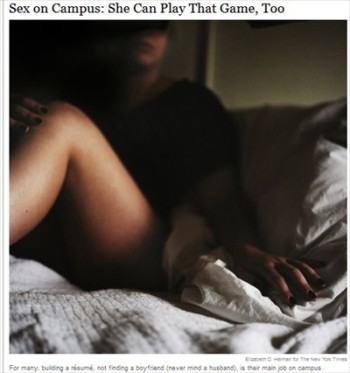
A screenshot from the New York Times image. (Credit: NYT, screenshot)
How can there be a trend of young women freely having unattached sexual encounters when none of the women publicly admit to their participation in the trend?
Kate Taylor’s article for The New York Times, “She Can Play That Game, Too,” chronicles young college women at the University of Pennsylvania who are turning to casual “hook-ups” instead of relationships because of demanding schedules and growing career ambitions. Taylor quotes (by name) two sociologists, one professor, one journalist and one alumna who give their opinions on these young women’s sexuality.
But none of the “more than 60 women” whom Taylor said she interviewed over nine months to back up her “trend” are named. Why?
Taylor wrote: “Because they believed that talking publicly about sex could come back to haunt them — by damaging their reputations at Penn, their families’ opinions of them or their professional future — the women spoke on the condition that their full names would not be revealed.”
“Most are identified by their first or middle names or by a middle initial.”
Taylor wrote that she spent a full academic year on this story. But she couldn’t find one woman to go on record? If this sexual liberation is so widespread, why couldn’t she get any named sources?
One of Taylor’s sources, identified as “A,”said “she didn’t want the number of people she had slept with printed, and she said it was important to her to keep her sexual life separate from her image as a leader at Penn.”
The Times has been criticized before for its promiscuous overuse of anonymous sources.
Former New York Times public editor Clark Hoyt wrote a 2009 column saying that the newspaper did not live up to its own anonymity rules. These editorial guidelines, tightened in 2004, are detailed in its Confidential Sources Policy.
The policy states: “The use of unidentified sources is reserved for situations in which the newspaper could not otherwise print information it considers reliable and newsworthy.” It continues, “Exceptions will occur in the reporting of highly sensitive stories, when it is we who have sought out a source who may face legal jeopardy or loss of livelihood for speaking with us.”
How does this apply Taylor’s sources?
By allowing her sources to tell stories anonymously, Taylor’s piece suggests shame and fear women have in being honest about their sex lives instead of profiling a trend of liberation. Since “legal jeopardy” isn’t obviously at stake here, the author’s use of anonymity implies that this trend of more freedom in young women’s sex lives necessitates that these same young women need protection from society’s negative judgment, resulting in a possible “loss of livelihood.”
iMediaEthics reached out to the New York Times Public Editor office for comment. The newspaper declined to respond on the record.
UPDATE: 7/17/2013 9:28 AM EST: Public Editor Margaret Sullivan posted a Q and A with the author yesterday, asking Taylor a selection of the many questions she said she received from readers. The questions are mostly content based– Why did she choose Penn? Why didn’t she speak with any men?
The issue of anonymity is only addressed in this question: “How difficult was it to get the women to speak freely?”
Taylor responded,
“It was very difficult, which is why I had to use middle names and even middle initials. Understandably, students were worried about future employers Googling them and seeing that they once talked about their sex lives. But beyond that, even students who said that they themselves didn’t have any regrets about their sexual experiences were concerned that other people would judge them for being too promiscuous.”
Is this a valid argument for anonymity? This piece is trying to have an honest discourse about the pros and cons of college girl’s sex lives. But if the girls must be anonymous, is the greater story that none of these girls are willing to say their names?






